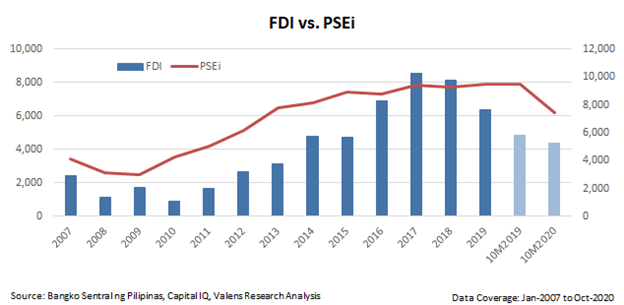MONDAY MACRO: Additional investor-friendly policies and a ‘BBB’ credit rating help solidify foreign investors’ confidence in the Philippines

With vaccines rolling out globally, 2021 is starting to look like the year when things can return to the way they were before the pandemic. This is not only a good sign for global economic recovery, but also for further economic growth in the Philippines, particularly as more countries look beyond their borders for attractive investment opportunities.
In today’s article, we take a look at how changes being made to investment policies will affect this measure of investment, and what that means for the Philippine economy.
Philippine Markets Daily:
The Monday Macro Report
Powered by Valens Research
As a developing country, the Philippines uses Foreign Direct Investments (FDI) as a major source of funding to spur economic growth. FDI measures the amount of capital that foreign investors use to expand or build foreign business operations or acquire foreign business assets in another company.
In our previous Monday Macro report about FDI, we talked about the different provisions and amendments that will help the Philippines attract a number of foreign investments in the country.
Some of the amendments are in the Foreign Investment Act (FIA) of 1991, which enables foreign investors to take full ownership of their small and medium-sized enterprises (SMEs).
That act also made changes to the Corporate Recovery and Tax Incentives for Enterprises (CREATE) Act (formerly CITIRA) so it would be more relevant for businesses with financial struggles during the pandemic.
Currently, the government is pushing for more investor-friendly amendments and policies seeing how important foreign investments are in helping the Philippines recover from the pandemic.
These policies are as follow:
- – The Retail Trade Liberalization Act (RTLA) will lower the minimum paid-up capital to $300,000 for foreign retail investors and require those with more than one physical store to invest at least $150,000 for each store. Additionally, only foreign retailers whose country of origin allows entry of Filipino retailers will be covered in the amendment.
- – The Public Service Act amendment aims to lift the limitations on foreign equity ownership on some sectors currently classified as public utility, such as the telecommunications and transport sectors.
- – The Financial Institutions Strategic Transfer (FIST) Act aims to help banks and financial institutions maintain good financial health and offset the effects of the pandemic.
These proposed amendments are expected to help investors regain confidence in the Philippine economy, making the country a more attractive investment to foreigners.
In the meantime, we take a look at the latest FDI data. In October 2020, FDI continued to register net inflows, although 25% lower at $423 million compared with the $561 million from October 2019. The lower monthly inflow is due to lower foreign investments in debt and reinvestment of earnings partly due to the rise in COVID-19 cases in the US, Japan, and Europe.
On a cumulative basis, FDI net inflows for the first 10 months of 2020 is 10% lower at $5.3 billion versus $5.9 billion net inflows in October 2019.

We can use the Philippine Stock Exchange Composite Index (PSEi) to determine the possible movement of FDI in the last quarter of 2020.
The PSEi is representative of the performance of the Philippine stock market. In the chart above, we can see that FDI has a direct correlation with the PSEi. In 2010, FDI net inflow was $1.1 million and the PSEi was at 3,522 points. Both indicators peaked in 2017, at net inflows of $10.3 millionand at 7,842 points, before declining to $9.8 million and 7,740 of net inflows and price levels in 2018, respectively.
However, in 2019, FDI recorded net inflows of only $7.7 million due to the global economic slowdown, a decline from the previous year, while the PSEi trended up at 7,908 points.
Fortunately, even with the recent discovery that the new strain of the virus is now in the Philippines, we did not see another bloodbath in the local stock market. This points to investor sentiment not being as negative as it was when community quarantines were first announced in March 2020.
Additionally, Fitch Ratings affirmed the Philippines with a ‘BBB’ credit rating last January 10, implying the Philippine economy is still on the right track to recovery. A stable to improving rating could lead to improved investor sentiment in the country, potentially boosting FDI inflows.
Furthermore, the improvements in the economic and credit fundamentals in the Philippines make it a compelling investment for large companies who plan to expand their operations. This will likely generate additional job opportunities, which would help stimulate consumer spending.
The inflows of investments, together with the government’s clear signal in pursuing investor-friendly policies and amendments, and the country receiving a stable credit rating outlook all point to a recovery this year, similar to the conclusion we had made in one of our Monday Macro reports last September.
About the Philippine Market Daily
“The Monday Macro Report”
When just about anyone can post just about anything online, it gets increasingly difficult for an individual investor to sift through the plethora of information available.
Investors need a tool that will help them cut through any biased or misleading information and dive straight into reliable and useful data.
Every Monday, we publish an interesting chart on the Philippine economy and stock market. We highlight data that investors would normally look at, but through the lens of Uniform Accounting, a powerful tool that gets investors closer to understanding the economic reality of firms.
Understanding what kind of market we are in, what leading indicators we should be looking at, and what market expectations are, will make investing a less monumental task than finding a needle in a haystack.
Hope you’ve found this week’s macro chart interesting and insightful.
Stay tuned for next week’s Monday Macro report!
Regards,
Angelica Lim
Research Director
Philippine Markets Daily
Powered by Valens Research
www.valens-research.com




